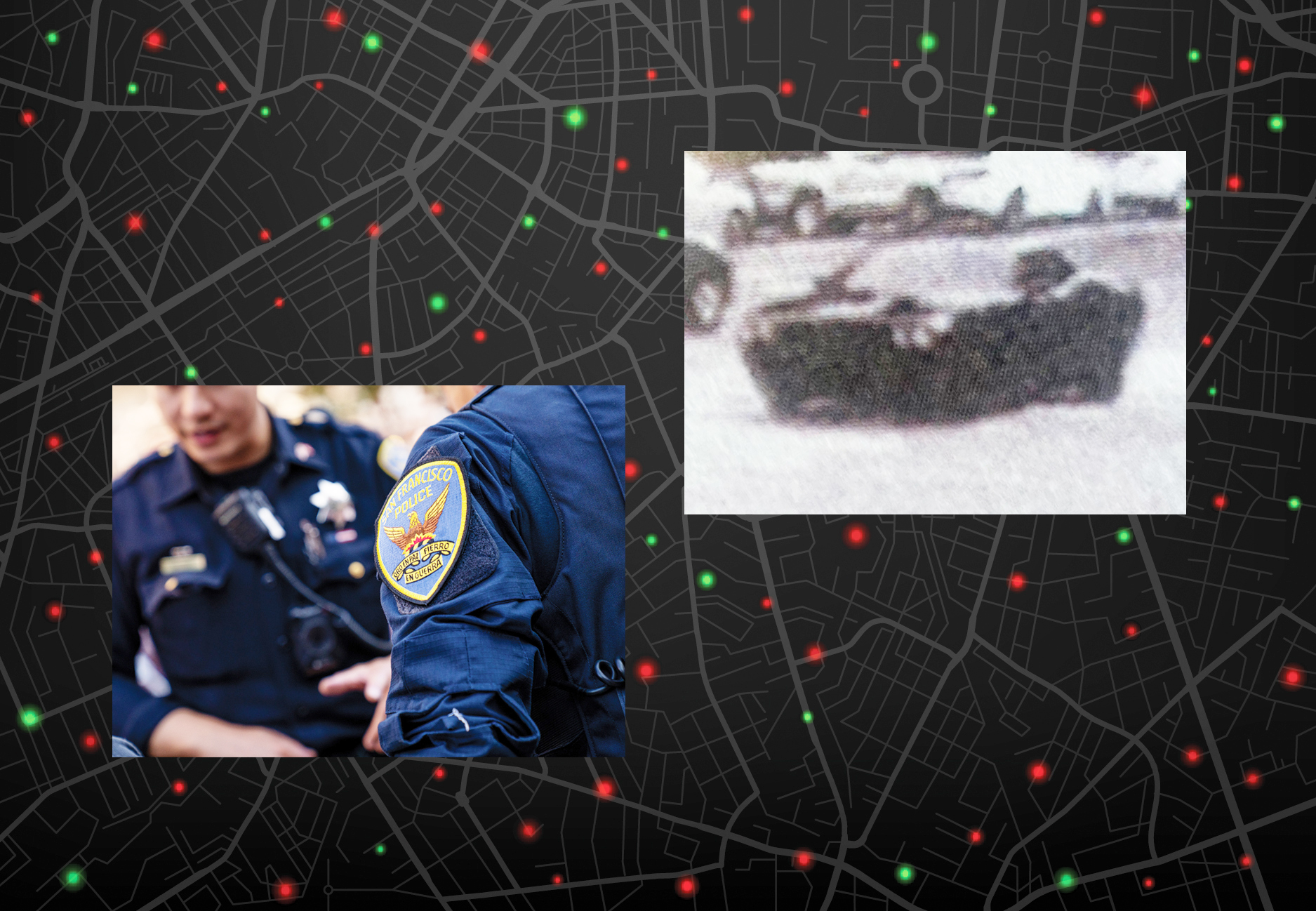When a San Francisco police officer put a GPS tracking device on a stolen Dodge Challenger, he thought it might lead to the arrest of a car break-in crew and help curb one of the city’s most ubiquitous crimes.
But the crime-busting tactic led to much more than the officer had hoped. The bounty of data provided by the tracker led to the arrest of four suspects in an unsolved homicide case—including one who’d fled halfway across the country.
As a result of that GPS tracker, those four suspects were charged last week in the June 5 fatal shooting of 25-year-old Yeurra Blaylock III in the Lower Haight.
When the suspects were charged Sept. 28—all pleaded not guilty—the San Francisco District Attorney’s Office acknowledged the novel way the investigation had unfolded.
“I would like to thank the San Francisco Police Department for their outstanding investigation that has led to the identification and arrest of these individuals,” District Attorney Brooke Jenkins said in a written statement.
Two of the men were charged with murder, three face weapons charges and three were also hit with numerous car break-in charges unrelated to the homicide.
READ MORE: Why Is San Francisco Called Bip City?
Police used the GPS data to build the murder and car burglary cases against the suspects, matching the car’s locations with video footage of its occupants, cellphone data, social media posts and eyewitness accounts, including from a witness to the fatal shooting, according to court documents reviewed by The Standard and information shared by a source with direct knowledge of the case.
The unique car break-in case-turned-homicide investigation also offers a glimpse into how police investigate car break-ins as San Francisco steps up efforts to reduce a crime that’s run rampant in the city for several years.
“We intend to catch people in the act,” SFPD Chief Bill Scott said at a press conference about increased policing related to car break-ins. The department, Scott said, has a two-pronged approach to combat vehicle break-ins and theft, including the use of bait cars and increased patrols in tourist areas. While he did not mention GPS tracking at the press conference, an officer said it’s not uncommon to use that tactic when dealing with stolen vehicles.
So far this year, the city has recorded 14,179 car break-ins, which is approximately on par with last year’s totals at this time, according to the police department.
Twists and Turns of the Investigation
The black Dodge Challenger’s front left tire was flat, and the vehicle looked like it had been dumped. It sat near a freeway off-ramp where stolen cars are often abandoned in San Francisco’s Ingleside neighborhood.
When SFPD officer Kevin Burke saw the car May 25, he immediately suspected it was stolen. He ran its license plate and discovered it came from a stolen Audi. When he ran the Challenger’s vehicle identification number, the database showed that it, too, had been reported stolen, court documents reviewed by The Standard revealed.
But Burke did not seize the car. Instead, he stuck a GPS tracker on it.
Less than two weeks later, just after 7 p.m. June 5, four men in a black Dodge Challenger drove to Webster Street just south of Rose Street. Three of them hopped out of the car, ran up the block and began firing guns at a group of eight people outside 417 Rose St., surveillance video detailed in the court documents said. Bullets hit cars, nearby homes and 25-year-old Blaylock.
The three gunmen and driver then fled. Blaylock died soon afterward at the hospital.
When the homicide investigators called to the scene that night found footage of the car nearby and ran the license plate, they discovered it came from a stolen car. Internal police records soon connected them to Burke, who informed his colleagues that the vehicle was a known “crime vehicle” that had been under surveillance since late May.
Social media posts by two of the suspects just hours before the shooting captured them in the same Challenger wearing clothes that matched those worn by two of the shooters, court records showed.
In another social media post obtained by police, one of the four suspects is seen inside the Challenger hours before the shooting as they drive over the Bay Bridge, a gun in his hand and with another suspect in view.
The GPS tracker put the car at the location of the shooting and revealed that as the car traveled around the city from May 25 to June 5, hitting up a gas station in the Excelsior and Pancho Villa Taqueria in the Mission. It was also at the location of at least 12 auto break-ins, according to the court records. Police obtained surveillance video and witnesses who could identify the car and several of the people in it at the 12 burglary locations.
The video evidence, GPS and cellphone location data and social media posts were enough for police to get an arrest warrant for four men. The four suspects were arrested Aug. 9.
Jeremiah Fisher, 28, Deniro Gulley, 24, Jamaree Willis, 21, and Chase Goodspeed-Taylor, 25 (who was arrested in Alabama) will appear in court at a preliminary hearing on Oct. 31.
Gulley and Goodspeed-Taylor face murder charges, and both allegedly committed the crimes while on bail or supervised release in other cases. Fisher stands accused of carrying a weapon while prohibited to do so and carrying a loaded firearm. Gulley, Willis and Goodspeed-Taylor also face burglary charges.
The defendants’ lawyers have yet to respond to requests for comment.
